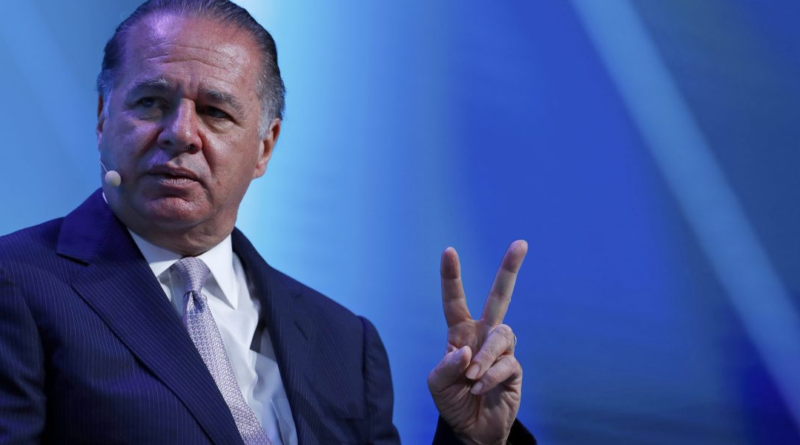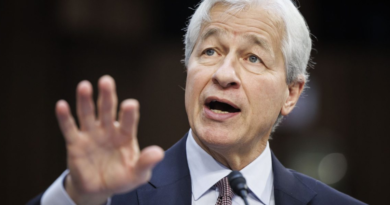Meet the former billionaires who pledged stock as collateral and were underwater when the margin calls came in
One CEO has been caught in the fallout from a souring leveraged buyout. Another is trying to make his business profitable after years of losses. And one founder is in a bitter dispute with his lenders after he was recently stripped of all executive roles.
The thing these individuals have in common? They’ve been forced to sell their slumping US-listed shares after they pledged them as collateral for personal loans.
The practice of pledging shares has boomed during the past decade as equity markets surged amid record-low interest rates. Nearly half of US chief executive officers have used the technique to secure loans, giving them access to cash without shrinking their stake in the business they’re running.
But when things sour, it can backfire spectacularly.Take Tellurian Inc. co-founder Charif Souki, once America’s best-paid executive. Last year, lenders to the one-time billionaire seized 25 million shares of the Houston-based natural gas firm that he had pledged in 2017 to secure loans for real estate investments. Worth about $250 million at the time of the pledge, they were sold for just $37 million after Tellurian’s stock hit a three-year low following the notification that virtually all of Souki’s stake had been seized.
“The whole thing can unravel quite quickly,” Jason Zein, a finance professor at the University of New South Wales’ business school, said on share pledges, which are often sensitive to fluctuations in interest rates. “If you’ve pledged at market highs, you could still be under water.”
Souki makes up the bulk of at least $50 million in pledged US stock sales since the start of last year, with the latest transactions filed in the past few weeks, according to data compiled by Bloomberg. A spokeswoman for Tellurian declined to comment, while a representative for Souki didn’t respond to a request for comment.
The most devastating part of pledged share sales for executives is that they’re often forced to offload their stock at precisely the wrong time: when it’s trading at multiyear lows. All together, the sold stakes were worth more than $330 million at the time the pledges were first disclosed, filings show.
‘Huge Impacts’
Souki, 71, was left with a stake of less than 1% in Tellurian after lenders led by Wilmington Trust sold most of his stock, filings show. He later sued his lenders, alleging they fueled a stock selloff for Tellurian after calling in the shares. He also claimed they sold his custom sailing yacht at a cut-rate price and improperly foreclosed on an 813-acre ranch he’d put into bankruptcy.
He was then ousted in December as Tellurian’s chairman and stripped of any executive roles as the company struggled to remain in business.
For Andy Moore, CEO of the investment banking arm of B. Riley Financial Inc., his forced sale came in the form of a margin call. His broker sold about $1.3 million worth of shares in November when B. Riley’s stock hit a three-year low. The financial services firm had recently reported a large quarterly loss and was facing questions about its involvement in the buyout of Franchise Group and ties to its former CEO, who has been linked to a hedge-fund fraud case.
And Blend Labs Inc. CEO Nima Ghamsari has offloaded about $1.5 million of stock in the fintech company through trading plans since the start of last year. He had pledged most of his stake to an undisclosed lender, with the latest sale in January, filings show. The San Francisco-based company’s stock has dropped about 88% since its 2021 initial public offering as it struggles to turn a profit, underscoring the risk of pledging shares if their value sinks.
“If the market swings like during the levels in the financial crisis, there can be huge impacts,” said Jihun Bae, assistant professor at the Rotterdam-based Erasmus School of Economics.
Pledging stock typically helps executives diversify their wealth. Oracle Corp. Chairman Larry Ellison has put up company shares to fund a lavish lifestyle that includes trophy properties, America’s Cup sailing teams and the Indian Wells tennis facility in California. Mat Ishbia, owner of the Phoenix Suns, pledged more than half of mortgage giant UWM Holdings Corp.’s outstanding stock last year to secure loans before buying the NBA team for a record $4 billion.
Lending against individual stocks or a portfolio of listed holdings is often easier and quicker for banks to process as the value of the collateral is more easily verifiable than less liquid assets such as real estate, art or superyachts. But it can also result in faster demands for extra collateral to cover borrowing costs if the pledge asset’s valuation declines.
Rising Rates
Axos Financial Inc. CEO Gregory Garrabrants sold pledged stock to help pay borrowing costs in August when the financial firm’s stock was falling, posting its longest streak of daily losses in almost a year.
While his lenders didn’t force those sales through a margin call, he more than doubled the shares pledged to secure his margin loan a year after he had disclosed it in September 2021. Since that first filing, the benchmark interest rate for federal funds in the US has surged from almost zero to more than 5%, putting pressure on borrowers who don’t have secured fixed monthly repayments for their loans.
Garrabrants still owns a roughly 2.7% stake worth about $80 million, based on the latest public filings.
“Pledge loans are generally on a floating rate,” said Zein. “Rising rates means the liability you have every month to repay the interest goes up. That makes pledging less attractive.”
Some US executives also pledge shares to buy extra stock in their business, even if it already makes up most of their fortune. The mean loan value for US executives pledging stock is $65 million, according to a 2019 research paper from University of Bern’s Kornelia Fabisik.
That was the case for Blend co-founder Ghamsari, a Stanford University computer science graduate who worked at Palantir Technologies Inc. before setting up the lending platform about a decade ago.
He leveraged his Blend stake for a personal loan he mostly used to acquire extra shares before Blend’s IPO, according to a statement from the company. He remains aligned with Blend’s long-term outlook, board of directors and other shareholders but will continue to sell stock from time to time to pay down the loan, the company said.
Ghamsari started disclosing sales of pledged shares in late 2022 when the company’s stock had fallen 94% below its July 2021 IPO price, valuing his shareholding at the time at about $200 million. His stake in Blend Labs has dropped by at least 25% since he began offloading shares, though he’s due to receive new stock options this year. Excluding those options, his current stake is worth less than $35 million.
On Friday, he filed to sell a further chunk of stock through Charles Schwab Corp.




